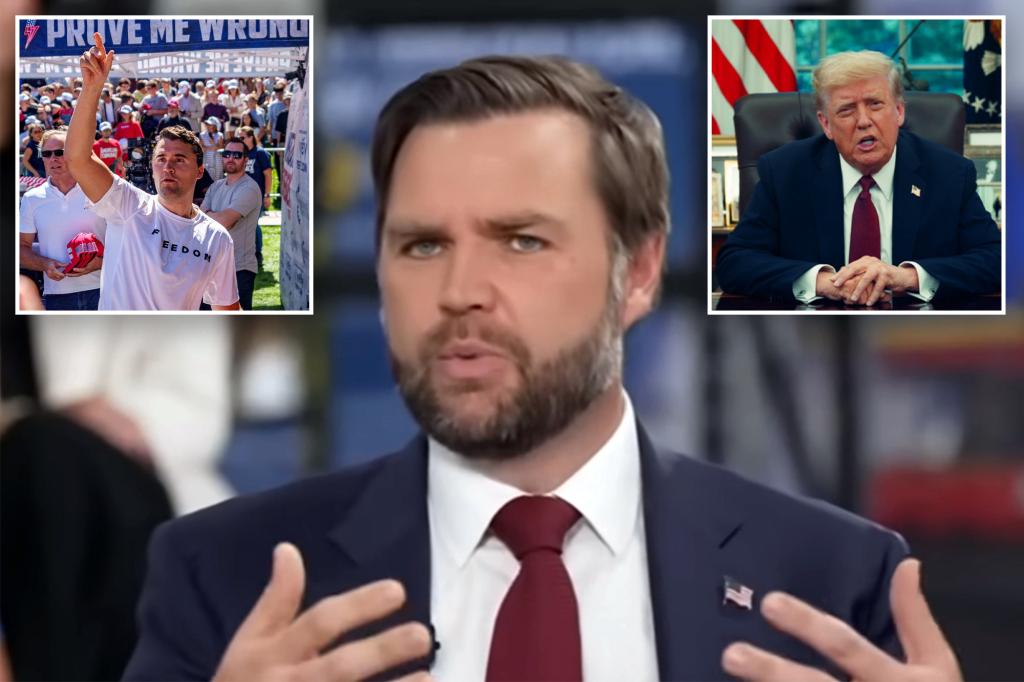JD Vance Recounts the Heartbreaking Moment of Delivering News of Charlie Kirk’s Death to President Trump
In a deeply personal interview with Fox News’ Jesse Watters, Vice President JD Vance shared the emotional experience of informing President Trump about Charlie Kirk’s assassination. Vance described the “very tough moment” when he entered the Oval Office to deliver the devastating news: “Mr. President, I’m sorry but Charlie’s passed.” The gravity of that responsibility was evident as Vance recounted how they “supported each other in that moment as you do with your friends,” while acknowledging the profound difficulty of the day. The conversation revealed not just the procedural aspects of crisis management in the White House but the human impact of losing someone who had been a friend and ally to many within the administration.
Vance recalled the chaotic sequence of events that unfolded on September 10th, beginning around 2:30 p.m. when his phone started receiving numerous messages. He had just finished a meeting in his West Wing office when he noticed “a bunch of group chats — frankly, a lot of them that Charlie was in — where they said ‘Charlie, praying for you, brother. Hope you’re doing OK.'” The reality of the situation hit him forcefully when someone opened his door and simply said, “Charlie’s been shot.” The 41-year-old Vice President immediately recognized the severity of what was happening to the 31-year-old Turning Point USA founder, who had been attacked while holding an event at Utah Valley University in Orem, Utah, allegedly by Tyler Robinson.
The hour following the shooting was filled with uncertainty and desperate attempts to gather information. “We called Mike and said, ‘hey, what’s going on?'” Vance recalled, apparently referring to Kirk’s chief of staff Mikey McCoy. The Vice President described how “the news was discombobulated. Nobody knew what was happening. It was a very chaotic moment.” There was a brief window of optimism when they received “good reports from the hospital,” but that hope was short-lived. Approximately an hour before the news became public, Vance and his team learned of Kirk’s death, prompting the Vice President to immediately head to the Oval Office to inform President Trump of the tragedy.
The scene in the Oval Office revealed the human side of political figures often viewed through a partisan lens. Upon arriving to deliver the news, Vance found White House Chief of Staff Susie Wiles visibly emotional – something he noted was unusual for someone known for being “even-keeled.” “I just gave Susie a hug and I guess all of us kind of lost it,” Vance shared, highlighting how the moment transcended political calculations and touched them all as human beings first. President Trump, according to Vance, remained “very stoic” after hearing about Kirk’s death. “He was clearly upset. He just went quiet and let it absorb a little bit. And then just shook his head and said, ‘Man, he was a good guy and we really loved him.'” This quiet, reflective response from the President underscored the personal connection many in the administration had with Kirk.
The assassination of Charlie Kirk, a father of two and influential conservative voice, left a profound impact on Vance personally. He admitted to watching video footage of the shooting once but refused to watch it again, stating firmly, “I don’t want to see that happen to my friend ever again.” In the hours following Kirk’s death, Vance shared a tribute to his “dear friend,” revealing that Kirk was one of the reasons he had decided to run for office in the first place. The Vice President detailed how their friendship had begun before 2018 and developed over the years, eventually leading to Vance being selected as Trump’s running mate. The personal connection between the two men highlighted how political relationships often extend beyond ideological alignment to form genuine bonds of friendship.
What emerged most powerfully from Vance’s interview was the reminder that behind political figures are human beings experiencing real grief and loss. “It felt like we were all mourning our friend before any of the politics or the thought about what a Titan he was, how influential he was to the movement, how could we possibly replace him, we were all just sad because our friend had died,” Vance reflected. This sentiment captured the essence of how Kirk’s death was processed within the administration – not primarily as a political assassination or a loss to a movement, but as the tragic death of a friend and colleague. In an era of intense political polarization, Vance’s candid sharing of this vulnerable moment offered a glimpse into the shared humanity that exists beyond partisan divides, reminding viewers that grief and friendship transcend political boundaries.


